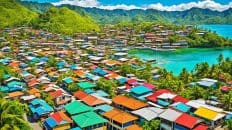Are you considering a life as an expat in the Philippines? Imagine immersing yourself in a tropical paradise, surrounded by stunning landscapes, vibrant culture, and friendly locals. But what does it really take to live abroad in the Philippines? How can you navigate the challenges and make the most of your expat experience in this beautiful country?
In this comprehensive guide, we will provide you with all the information you need to know about living as an expat in the Philippines. From finding housing and understanding transportation options to discovering the expat community and experiencing the local culture, we’ll cover it all. Get ready to embark on an exciting journey as we uncover the secrets to a fulfilling expat life in the Philippines.
Key Takeaways
- Living as an expat in the Philippines offers a tropical lifestyle filled with natural beauty and vibrant culture.
- Transportation in the Philippines includes options like driving, taxis, ride-hailing apps, trains, buses, jeepneys, and boats.
- The cost of living in the Philippines is relatively low, making it an attractive destination for expats seeking an affordable lifestyle.
- Understanding visa and immigration requirements is important for expats planning to live in the Philippines.
- Finding suitable accommodation is crucial, with options ranging from apartments to houses and condominiums.
Public Transportation in the Philippines
Public transportation in the Philippines is a popular choice for both locals and expats. However, it can be crowded and hectic, which is why many expats opt for alternative transportation options such as driving or using taxis. Let’s explore the various modes of transportation available in the Philippines:
Taxis and Ride-Hailing Apps
Taxis are widely available in major cities and tourist destinations in the Philippines. The drivers usually speak basic English, making it easier for expats to communicate their destinations. Alternatively, ride-hailing apps like Grab and Go-Jek have gained popularity, offering a convenient and reliable transportation option with upfront pricing and cashless payments.
Driving in the Philippines
If you plan to stay in the Philippines for an extended period and prefer the flexibility of having your own vehicle, getting a local driver’s license is essential. Expats can drive using an International Driving Permit (IDP) or obtain a local license valid for one year. It’s important to note that traffic conditions can be challenging in some areas, especially during peak hours.
Trains, Buses, Jeepneys, Boats, and Ferries
For both short and long distances, expats can consider using trains, buses, jeepneys, boats, and ferries. Trains are available in Metro Manila through the Light Rail Transit (LRT) and Metro Rail Transit (MRT) systems. Buses are a common mode of transportation for intercity travel, with various bus companies servicing different routes. Jeepneys, iconic public utility vehicles in the Philippines, are best for short trips within cities. Lastly, boats and ferries are popular for island-hopping and exploring the country’s beautiful coastal areas.
Philippine Airlines
Philippine Airlines is the national carrier of the Philippines and offers domestic and international flights. It provides convenient air travel options for expats who need to travel between different islands or back to their home countries. The airline strives to deliver a comfortable and enjoyable flying experience for passengers.
In summary, public transportation in the Philippines offers a diverse range of options for expats. From taxis and ride-hailing apps to driving, trains, buses, jeepneys, boats, and ferries, there are various ways to navigate the country. Choosing the most suitable mode of transportation depends on factors such as convenience, distance, and personal preferences. By understanding the available options, expats can efficiently and safely explore the Philippines.
Cost of Living in the Philippines
The cost of living in the Philippines is incredibly affordable, making it an attractive destination for expats seeking an affordable tropical lifestyle. With a relatively low cost of living compared to many other countries, you can enjoy a comfortable lifestyle without breaking the bank.
When budgeting for your life in the Philippines, you can expect to spend around $1000 – $1500 per month. This budget allows for expenses such as accommodation, utilities, transportation, groceries, dining out, and entertainment.
Breakdown of Living Expenses
Let’s take a closer look at the typical living expenses you can expect in the Philippines:
| Expense | Average Monthly Cost (USD) |
|---|---|
| Accommodation | $300 – $600 |
| Utilities (electricity, water, internet) | $100 – $200 |
| Transportation (public or private) | $50 – $100 |
| Groceries | $150 – $300 |
| Dining Out | $100 – $200 |
| Entertainment | $100 – $200 |
These figures are approximate and can vary depending on your location, lifestyle, and personal preferences. By budgeting wisely and making cost-effective choices, expats can stretch their finances and enjoy a comfortable standard of living.
Living in the Philippines offers an affordable lifestyle without compromising on quality. Expats can embrace a tropical paradise, indulge in delicious local cuisine, and explore the vibrant culture and natural beauty, all within a reasonable budget.
Whether you choose to live in bustling urban centers like Manila or opt for a more tranquil island life, the cost of living in the Philippines allows you to afford an enjoyable lifestyle without sacrificing your financial stability.
In the next section, we’ll dive into the necessary visa and immigration requirements for expats planning to live in the Philippines.
Visa and Immigration in the Philippines
As an expat planning to move to the Philippines, understanding the visa and immigration requirements is crucial. This section will guide you through the process and provide the necessary information to make your transition as smooth as possible.
Visa Requirements in the Philippines
Upon arrival in the Philippines, most nationalities are granted either a 30-day or 59-day tourist visa. If you plan to stay longer, you have the option to extend your tourist visa for a maximum of 36 months. It is advisable to start the extension process well in advance to avoid any complications.
Working in the Philippines requires a work visa or permit. To obtain a work visa, you will need a job offer from a Philippine employer. The necessary documents and requirements may vary, so it is best to consult with the Bureau of Immigration or a trusted immigration lawyer to ensure a smooth application process.
Extending Your Tourist Visa
If you plan to stay in the Philippines beyond the initial tourist visa period, you can extend your stay by visiting the Bureau of Immigration office. The visa extension process typically requires completing an application form, paying the necessary fees, and providing proof of financial capability to support your stay.
Consulting with Bureau of Immigration
The Bureau of Immigration in the Philippines is the authoritative source for the most up-to-date visa information and requirements. It is highly recommended to consult with their official website or visit their office to get accurate and detailed guidance regarding your specific visa needs.
Summary Table: Visa Options in the Philippines
| Visa Type | Description |
|---|---|
| Tourist Visa | Granted upon arrival for most nationalities. Can be extended for up to 36 months. |
| Work Visa | Required for working in the Philippines. Obtained through a job offer from a Philippine employer. |
| Retirement Visa (SRRV) | Allows retirees to stay long-term in the Philippines with various benefits and privileges. |
It is essential to ensure that you have the appropriate visa to comply with the immigration laws and regulations in the Philippines. Consulting with the Bureau of Immigration and seeking professional advice can help you navigate the visa process and ensure a successful transition to living as an expat in the Philippines.

Finding Accommodation in the Philippines
Finding suitable accommodation is a crucial aspect of settling in as an expat in the Philippines. With a variety of options available, from apartments to houses and condominiums, you can find a home that meets your needs and preferences. Whether you are looking for a place in the bustling metropolis of Metro Manila or a peaceful retreat in the countryside, there is something for everyone.
When considering accommodation, it is important to factor in the cost of housing. The prices vary depending on the location and type of property. In popular expat-friendly neighborhoods such as Makati, Ortigas, and Bonifacio Global City, the cost of housing may be higher due to their convenient location and amenities. However, there are also more affordable options available in other areas of the country.
To simplify your search for the perfect place to call home, it is advisable to work with a trusted real estate agent who can assist you in finding suitable options within your budget. Online platforms dedicated to real estate in the Philippines can also be a valuable resource, allowing you to browse through listings and even schedule viewings.
Tips for Finding Expat-Friendly Neighborhoods
- Research different areas and consider factors such as proximity to amenities, safety, and accessibility to your workplace or children’s schools.
- Speak to other expats or join expat forums to gather firsthand information and recommendations.
- Visit the neighborhoods you are considering to get a feel for the atmosphere and see if it aligns with your preferences.
- Consult with your real estate agent or online platforms to explore the available options in expat-friendly neighborhoods.
By taking these steps and exploring your options, you can find the perfect accommodation that suits your needs and budget, allowing you to settle into your new life in the Philippines with ease.
Cost of Housing in Popular Expat-Friendly Neighborhoods
Healthcare in the Philippines
The healthcare system in the Philippines is steadily improving to meet the needs of its residents and expat community. However, it’s important to note that the standards may not be on par with those of other developed countries. As an expat, it is crucial to have adequate health insurance coverage to ensure access to quality medical care.
There are both public and private medical facilities available throughout the country. While public hospitals and clinics offer more affordable options, private facilities generally provide higher quality care and a wider range of services. It is advisable to research and choose a reputable healthcare provider that suits your needs, allowing you to receive the best possible treatment.
Health insurance in the Philippines is essential for expats, as it helps cover the costs of medical expenses. Having comprehensive coverage ensures access to the best doctors, specialists, and hospitals. It also provides peace of mind knowing that you are financially protected in case of unexpected medical emergencies.
When considering the cost of healthcare in the Philippines, it is generally more affordable compared to other countries. Medical fees and treatment expenses can vary depending on the type of service required. It’s recommended to familiarize yourself with local healthcare costs and make informed decisions about your health coverage to avoid any unexpected financial burden.
Healthcare Overview in the Philippines
| Public Healthcare | Private Healthcare |
|---|---|
| – Affordable but may have longer waiting times | – Higher quality care and shorter waiting times |
| – Limited facilities and resources | – Extensive facilities and advanced medical technology |
| – Accessible in most areas, especially major cities | – Available in major cities and popular expat destinations |
It is recommended to consult with expat networks, healthcare professionals, and your insurance provider to gain a better understanding of the healthcare landscape in the Philippines. This will help you make informed decisions about your health and well-being during your time as an expat in this tropical paradise.
Safety and Security in the Philippines
While the Philippines is generally considered a safe country, it is important for expats to prioritize their personal safety and take necessary precautions. By following these personal safety tips, you can ensure a secure and enjoyable experience during your time as an expat in the Philippines:
- Be aware of your surroundings: Pay attention to your surroundings at all times, especially in crowded areas or unfamiliar locations. Stay vigilant and trust your instincts if something feels off.
- Avoid isolated areas at night: It is advisable to avoid walking alone in secluded areas, particularly at night. Stick to well-lit, populated areas and consider using transportation services like taxis or ride-hailing apps.
- Secure your belongings: Keep your personal belongings secure to minimize the risk of theft or pickpocketing. Use locks on bags or backpacks, and be cautious with your valuables, such as passports, wallets, and electronics.
- Follow local authorities’ advice: Stay updated on any travel advisories or warnings issued by local authorities. It is essential to heed their advice and comply with regulations to ensure your safety.
By being aware, cautious, and taking the necessary precautions, expats can enjoy their time in the Philippines with peace of mind. Remember that safety is a priority, and staying informed and prepared is key to a positive expat experience.
“Safety is a top priority for expats in the Philippines. By staying alert, following local advice, and securing your belongings, you can enjoy the beauty and vibrant culture of this tropical destination.” – Local Expat
Crime Rates in the Philippines
| Year | Homicide Rate | Robbery Rate | Burglary Rate |
|---|---|---|---|
| 2017 | 8.0 per 100,000 | 61.9 per 100,000 | 151.3 per 100,000 |
| 2018 | 6.3 per 100,000 | 47.7 per 100,000 | 124.3 per 100,000 |
| 2019 | 5.9 per 100,000 | 43.4 per 100,000 | 114.2 per 100,000 |

Expat Community in the Philippines
Living as an expat in the Philippines can be an exciting and enriching experience, especially when you connect with the vibrant expat community that thrives in the country. Whether you’re seeking friendship, support, or a sense of belonging, there are numerous expat social groups and events available to help you build connections and make the most of your expat life.
Joining these expat communities can provide you with a valuable support network, allowing you to share experiences, gather information, and receive practical advice from fellow expats who understand the challenges of living abroad. You’ll find people who have navigated similar situations and can offer guidance on various aspects of expat life in the Philippines.
To discover expat social groups and events in the Philippines, you can explore various online platforms and social media groups that cater specifically to expats. These platforms serve as virtual meeting places where expats can connect, exchange ideas, and find information about upcoming gatherings and events.
You’ll find a wide range of expat events happening throughout the year, including meetups, cultural celebrations, recreational activities, and networking sessions. These events create opportunities for expats to socialize, connect, and forge meaningful relationships with like-minded individuals who share similar interests and experiences.
When you participate in expat social groups and events, you can not only expand your social circle but also gain valuable insights into the local culture and customs. Engaging with the expat community allows you to learn from each other’s experiences, discover hidden gems, and gain a deeper understanding of the Philippines from a unique perspective.
“Joining the expat community in the Philippines can enrich your expat experience and make it even more fulfilling. It’s an incredible opportunity to connect with diverse individuals, form lasting friendships, and create memories that will last a lifetime.”
So, whether you’re looking to make new friends, seek support, or simply want to embrace the camaraderie of the expat community, don’t hesitate to get involved. By joining expat social groups and attending events, you’ll find a warm and welcoming community that is ready to embrace you as part of the expat family in the Philippines.
| Benefits of Joining the Expat Community in the Philippines |
|---|
| Opportunity to make new friends who understand the expat experience |
| Access to practical advice and information from experienced expats |
| Networking opportunities for personal and professional connections |
| Exposure to diverse cultures and perspectives |
| Opportunities to participate in cultural celebrations and events |
| Access to local insights and recommendations |
Work Opportunities for Expats in the Philippines
The Philippines presents a wealth of job opportunities for expats, particularly in industries such as IT, outsourcing, and tourism. With its growing economy and English-speaking workforce, many international companies have set up operations in the country, creating a demand for skilled professionals.
Expat jobs in the Philippines
A Booming Job Market
The job market in the Philippines is dynamic and diverse, offering a range of positions for expats. The country has a strong outsourcing industry, providing opportunities in customer service, technical support, and IT-related roles. The IT and software development sectors are also thriving, with numerous multinational companies establishing their presence in the country.
Working Remotely in the Philippines
Working remotely in the Philippines
The rise of digital technology and the increasing trend of remote work have opened up opportunities for expats to work from anywhere in the world, including the Philippines. Remote work allows individuals to participate in the global job market while enjoying the tropical lifestyle and cost advantages of living in the Philippines.
Many expats choose to work remotely as freelancers, consultants, or telecommuters for companies based overseas. With a reliable internet connection and a dedicated workspace, expats can leverage their skills and experience to work with clients around the globe, all from the comfort of their home or preferred coworking space in the Philippines.
Starting a Business in the Philippines
Starting a business in the Philippines
The Philippines offers favorable conditions for expats looking to start their own businesses. The government has implemented programs and incentives to encourage foreign investment, making it easier for expats to establish and operate their ventures.
Entrepreneurs can explore various sectors for business opportunities, including tourism, food and beverage, e-commerce, and services. With a population of over 100 million people and a growing middle class, the Philippines presents a sizable market for both domestic and international businesses.
Additionally, the country has established special economic zones and free trade zones that offer tax incentives and easier access to markets. Expats interested in starting a business in the Philippines can take advantage of these initiatives and tap into the country’s potential for growth and profitability.
Researching Opportunities and Networking
Before making the move to the Philippines, it is crucial for expats to research the job market and potential opportunities that align with their skills and career goals. Job search platforms, networking events, and online communities specific to expats and professionals in the Philippines can be valuable resources for gathering information and making connections.
Networking is particularly important in the Philippines, where personal relationships and referrals play a significant role in the job market. Connecting with local professionals, attending industry events, and joining relevant associations can enhance job prospects and provide insights into the business landscape.
“The Philippines offers a wealth of job opportunities for expats, from established industries to the thriving digital economy. With its competitive advantages and supportive business environment, the country is an attractive destination for expats seeking career growth and new ventures.”
Education for Expats in the Philippines
When moving to the Philippines as an expat, providing a quality education for your children is undoubtedly a top priority. Fortunately, the Philippines offers a range of options for expat education, including international schools and homeschooling.
International Schools in the Philippines
International schools in the Philippines are designed to meet the educational needs of expat families. These schools follow an international curriculum, providing a globally recognized education. They offer a diverse learning environment with students from different cultural backgrounds, fostering a sense of inclusivity and global awareness.
International schools often provide a wide range of academic programs, extracurricular activities, and support services to ensure a holistic educational experience. They have qualified and experienced teachers who are trained to deliver high-quality education to meet international standards.
When choosing an international school for your child, it is recommended to research and visit different schools to find the best fit for their education. Consider factors such as curriculum, class sizes, facilities, and extracurricular offerings. Many international schools also offer opportunities for parent involvement, creating a strong sense of community.
Homeschooling in the Philippines
Homeschooling is another option for expat families in the Philippines who prefer to have more control over their children’s education. Homeschooling allows parents to tailor their child’s education to their specific needs and values.
There are various homeschooling programs and resources available in the Philippines that provide structured curriculum and support for parents. These programs offer flexibility in terms of scheduling and pace of learning, allowing children to pursue their interests and learn at their own pace.
It is important to note that homeschooling in the Philippines requires compliance with certain legal requirements. Parents must register with the Department of Education (DepEd) and follow the guidelines and regulations set by the department. Engaging with local homeschooling communities and support groups can also provide valuable resources and advice for a successful homeschooling journey.
Whether you choose an international school or opt for homeschooling, it is crucial to prioritize your child’s education and provide them with a nurturing learning environment that supports their growth and development.
| Education Option | Advantages | Considerations |
|---|---|---|
| International Schools | – Globally recognized education – Diverse learning environment – Wide range of academic and extracurricular activities | – Higher tuition fees – Limited availability in certain areas – Admissions process |
| Homeschooling | – Customized education – Flexibility in scheduling and pace of learning – Parental involvement | – Compliance with legal requirements – Parents as primary educators – Socialization opportunities |
Cultural Differences and Adaptation
Living as an expat in the Philippines means embracing a unique culture and way of life. Filipinos are renowned for their warm hospitality, friendliness, and strong sense of community. To fully integrate into the local culture, it is important for expats to respect and learn about Filipino customs and traditions.
Filipino Hospitality
Filipinos are known for their warm and welcoming nature, making it easy for expats to form connections and build relationships. It is common for Filipinos to invite friends and acquaintances to their homes for meals or celebrations. Embrace this hospitality and reciprocate the kindness by participating in social gatherings and accepting invitations.
Respect for Elders
In Filipino culture, respect for elders is highly valued. It is customary to greet older individuals with “po” or “opo” (words denoting respect) and to show deference to their opinions and decisions. This respect extends to family dynamics, where elders hold an esteemed position and are often consulted for guidance.
Family-Centered Culture
Family plays a central role in Filipino society. It is common for extended families to live in the same household or in close proximity. The concept of “utang na loob,” or a debt of gratitude, is highly regarded. This means that Filipinos often feel indebted to their family and are expected to provide support and assistance when needed.
“The Filipino culture values respect, strong family ties, and a sense of community. By embracing and appreciating these cultural differences, expats can form deeper connections and create meaningful experiences during their time in the Philippines.”
Religious Traditions
The Philippines is predominantly Catholic, with a strong influence of Spanish colonialism. This is evident in the religious traditions and celebrations that take place throughout the year. Participating in religious festivals, such as the vibrant Sinulog festival in Cebu, can provide expats with a deeper understanding of Filipino culture and a chance to immerse themselves in local customs.
Non-Verbal Communication
Non-verbal communication, such as facial expressions, hand gestures, and tone of voice, plays an important role in Filipino culture. It is common for Filipinos to be indirect in their communication, using subtle cues to convey their feelings or intentions. Pay attention to these non-verbal cues to better understand and connect with the people around you.
| Customs and Traditions | Description |
|---|---|
| Paskong Pinoy (Filipino Christmas) | A vibrant and festive celebration of Christmas, starting as early as September. It includes family gatherings, food, music, and the world-famous Simbang Gabi (Night Masses). |
| Bahay Kubo (Nipa Hut) | A traditional Filipino dwelling made of bamboo and nipa palm leaves. It represents simplicity, community, and the close connection to nature. |
| Bayanihan (Community Spirit) | The Filipino tradition of coming together as a community to help a neighbor or friend in need, often involving physically moving a house or assisting with agricultural activities. |
By immersing yourself in the Filipino culture, respecting local customs, and adapting to the way of life, you can fully embrace the expat experience in the Philippines. Building genuine connections and understanding the nuances of the culture will enrich your time in this beautiful country.

Leisure and Recreation in the Philippines
When it comes to leisure and recreation, the Philippines offers a plethora of options for expats to indulge in. From pristine beaches and picturesque islands to verdant mountains and captivating cultural heritage sites, there is no shortage of activities to partake in.
Exploring the natural wonders of the Philippines should be at the top of every expat’s to-do list. Immerse yourself in the crystal-clear waters of world-renowned tourist attractions such as El Nido, Boracay, and Palawan. Dive into the vibrant underwater world of Tubbataha Reefs Natural Park or go surfing in Siargao, known as the “Surfing Capital of the Philippines.”
For those seeking a dose of adventure, the Philippines offers a plethora of outdoor activities. Go hiking in the stunning landscapes of Mount Pulag or Mount Mayon. Embark on an island-hopping tour around the captivating Visayas region. Immerse yourself in the rich history and cultural heritage of sites like Vigan City, the Chocolate Hills in Bohol, or the majestic Banaue Rice Terraces.
No exploration of the Philippines would be complete without indulging in the diverse and delectable cuisine. From mouthwatering dishes like adobo and sinigang to indulgent desserts like halo-halo and bibingka, the Filipino food scene is a culinary delight waiting to be savored.
Immerse yourself further into the rich Filipino culture by participating in local events and festivals. Witness the grandeur of the Sinulog Festival in Cebu or the vibrant Ati-Atihan Festival in Kalibo. Experience the colorful traditions and customs of the Philippines through dance, music, and art.
So, whether you prefer to relax on pristine beaches, hike through lush mountains, delve into fascinating history, or savor delectable cuisine, the Philippines offers an array of leisure and recreational activities to make your expat life truly remarkable.
Expatriate Taxes and Financial Considerations
When living as an expat in the Philippines, it is crucial to consider the implications of expatriate taxes and plan your finances accordingly. Consulting with a financial advisor or tax professional can provide valuable insights into understanding your tax obligations and optimizing your financial situation.
Managing expatriate taxes can be complex, as it involves navigating the tax systems of both your home country and the Philippines. Different countries have varying tax treaties and agreements, impacting your tax residency status, exemptions, and deductions.
Financial planning for expats is essential to ensure compliance with tax regulations and maximize your financial well-being. A financial advisor can help you strategize your investments, identify tax-saving opportunities, and plan for the future.
Additionally, understanding the currency exchange process is essential for expats in the Philippines. As an expat, you may need to exchange your home currency for Philippine Pesos to meet your day-to-day expenses. Currency exchange services are readily available in the country, but it is important to compare rates and fees to secure the best value.
Conducting thorough research and staying informed about exchange rates and fees will help you optimize your currency exchanges and minimize unnecessary costs.
By proactively addressing your expatriate taxes and financial considerations, you can ensure a stable and prosperous financial future during your time in the Philippines.
Tax Planning Tips for Expats in the Philippines
- Research tax treaties between your home country and the Philippines to understand the impact on your tax obligations.
- Seek professional advice from a tax consultant or advisor familiar with expat tax regulations.
- Keep organized records of your income, expenses, and deductions to simplify the tax filing process.
- Explore available tax exemptions and deductions for expats, such as housing allowances or education expenses.
- Utilize tax-efficient investment options and retirement savings accounts to optimize your financial situation.
“Proactive tax planning can help expats navigate the complexities of the tax system and ensure compliance while optimizing their financial well-being.”
Currency Exchange Tips for Expats in the Philippines
- Compare exchange rates and fees offered by different currency exchange providers.
- Consider using reputable banks or licensed money changers for secure and reliable currency exchanges.
- Be cautious of unofficial street vendors offering currency exchange services, as they may offer unfavorable rates or engage in illegal activities.
- Monitor exchange rates to identify favorable times for currency conversions.
- Consider using currency exchange apps or online platforms for convenient and competitive rates.
Conclusion
Living as an expat in the Philippines offers a unique and rewarding experience. The tropical lifestyle, vibrant culture, and welcoming expat community make it an attractive destination for those seeking a new adventure. By embracing the Philippines’ natural beauty, immersing in its rich traditions, and connecting with fellow expats, you can create lasting memories and forge a fulfilling expat life.
However, to ensure a smooth transition and successful experience, it’s important to be prepared. Thorough research and understanding of the visa and immigration requirements, cost of living, and healthcare options will help you make informed decisions. Seek support from local resources, such as real estate agents, healthcare providers, and expat communities, to navigate any challenges that may arise along the way.
As you embark on this exciting journey, remember to approach it with an open mind and a willingness to embrace new experiences. Engage with the local culture, try traditional cuisine, explore the breathtaking landscapes, and participate in festivals and events. By immersing yourself in all that the Philippines has to offer, you will create cherished memories and make the most of your expat life in this beautiful country.
FAQ
What are the transportation options for expats in the Philippines?
Expats in the Philippines can choose to drive, use taxis, ride-hailing apps, trains, buses, jeepneys, boats, and Philippine Airlines for air travel.
How much does it cost to live as an expat in the Philippines?
The cost of living in the Philippines is relatively low, with an estimated monthly expenditure of $1000 – $1500 for a comfortable lifestyle.
What are the visa and immigration requirements for expats in the Philippines?
Expats in the Philippines are granted tourist visas upon arrival, which can be extended. Working in the Philippines requires a work visa or permit, while retirees can apply for a retirement visa.
Where can expats find suitable accommodation in the Philippines?
Expats can find accommodation options such as apartments, houses, and condominiums. Popular expat-friendly neighborhoods include Makati, Ortigas, and Bonifacio Global City.
What is the healthcare system like for expats in the Philippines?
The healthcare system in the Philippines is improving, but it is advisable for expats to obtain health insurance. There are public and private hospitals and clinics available.
How can expats ensure their safety in the Philippines?
Expats should be aware of their surroundings, avoid isolated areas at night, and secure their belongings. It is advisable to follow the advice of local authorities and stay updated on any travel advisories.
Is there an expat community in the Philippines?
Yes, the Philippines has a vibrant expat community with social groups and events for expats to connect and make friends. Online platforms and social media groups are available for finding information about expat gatherings and events.
Are there job opportunities for expats in the Philippines?
Yes, there are job opportunities for expats in industries such as IT, outsourcing, and tourism. Many expats also work remotely or start their own businesses in the country.
What education options are available for expat children in the Philippines?
There are various international schools in the Philippines that cater to expat children. Homeschooling is also an option for those who prefer to educate their children at home.
How can expats adapt to the culture and way of life in the Philippines?
Expats should respect and learn about Filipino customs and traditions to better integrate into the local community.
What leisure and recreational activities are available for expats in the Philippines?
Expats in the Philippines can enjoy activities such as exploring beautiful beaches and islands, visiting cultural heritage sites, and trying local cuisine.
What are the financial considerations for expats in the Philippines?
Expats should consult with a financial advisor or tax professional to understand their tax obligations and plan their finances accordingly. Currency exchange services are readily available in the country.
Any final thoughts on living as an expat in the Philippines?
Living as an expat in the Philippines offers a unique and rewarding experience, with a tropical lifestyle, vibrant culture, and a supportive expat community.


















Add comment